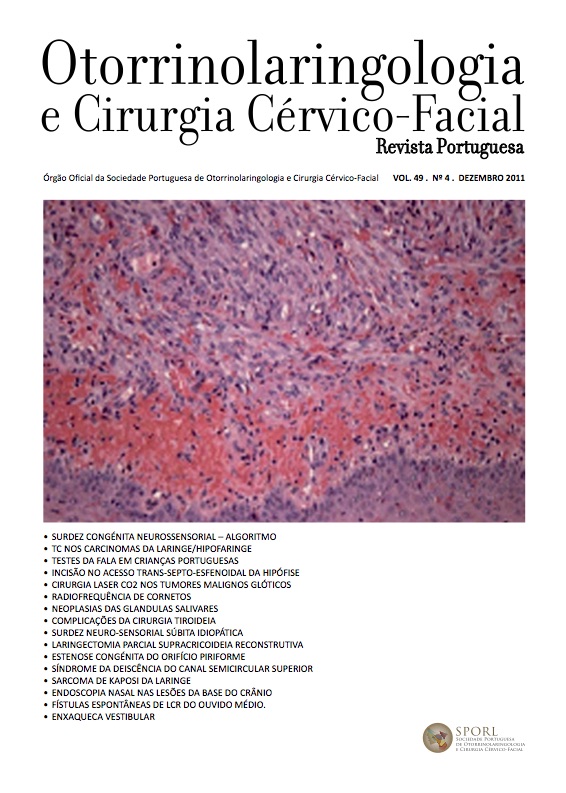Role of CT in treatment decisions in laryngeal/ hypopharyngeal carcinomas
DOI:
https://doi.org/10.34631/sporl.190Keywords:
Laryngeal carcinoma, Neck dissection, Computed tomography, StagingAbstract
Objectives: The presence of adenopathies can be evaluated clinically by tomographic imaging. The aim is to assess if computed tomography (CT) provides additional information that may influence therapeutic decisions.
Methods: Retrospective review of medical records of patients undergoing surgery of the larynx and neck dissection for cancer between May 2001 and December 2010.
Results: Of the 31 patients clinically and radiographically staged as N0, 26 were confirmed by pathology (83.9%) and 5 cases had metastatic lymph nodes (16.1%). Of the three patients clinically staged as N0 and staged by imaging as N> 0 in 2 was confirmed the presence of adenopathies by pathology (66,7%). Of the 6 patients clinically N> 0, CT staged as N> 0 5 patients who were confirmed to be N> 0 by pathology (100%). In this study CT showed sensitivity, positive predictive value and negative predictive value superior to the clinic.
Conclusion: CT appears to enhance the predictive value in detecting cervical metastases, but the percentage of occult neck metastases currently imposes a neck dissection in N0 necks.
Downloads
References
Connor S. Laryngeal Cancer: How Does The Radiologist Help? Cancer Imaging 2007; 7: 93-103.
Hermans R. Staging of Laryngeal and Hypopharyngeal Cancer: Value of Imaging Studies. European Radiology 2006;16: 2386-2400.
Zbaren P, Becker M, Lang H. Pretherapeutic Staging of Laryngeal Carcinoma. American Cancer Society 1996; 1263-1273.
Blitz AM, Aygun N. Radiologic Evaluation of Larynx Cancer. Otolaryngologic Clinics of North America 2008; 697-713.
Deschler DG, Day T. TNM Staging of Head and Neck Cancer and Neck Dissection Classification. American Academy of Otolaryngology – Head and Neck Surgery Foundation 2008; 10-23.
Ferlito A, Silver CE, Rinaldo A. Selective Neck Dissection (IIA, III): A Rational Replacement for Complete Functional Neck Dissection in Patients With N0 Supraglottic and Glottic Squamous Carcinoma. The Laryngoscope 2008; 118:676-679.
Mnejjaa M, Hammamia B, Bougachaa L, Chakrouna A, et al. Occult Lymph Node Metastasis in Laryngeal Squamous Cell Carcinoma: Therapeutic and Prognostic Impact. European Annals of Otorhinolaryngology, Head and Neck diseases 2010; 127: 173-176.
Gallo O, Boddi V, Bottai GV, Parrella F, et al. Treatment of the Clinically Negative Neck in Laryngeal Cancer Patients. Head & Neck 1996; 566-572.






